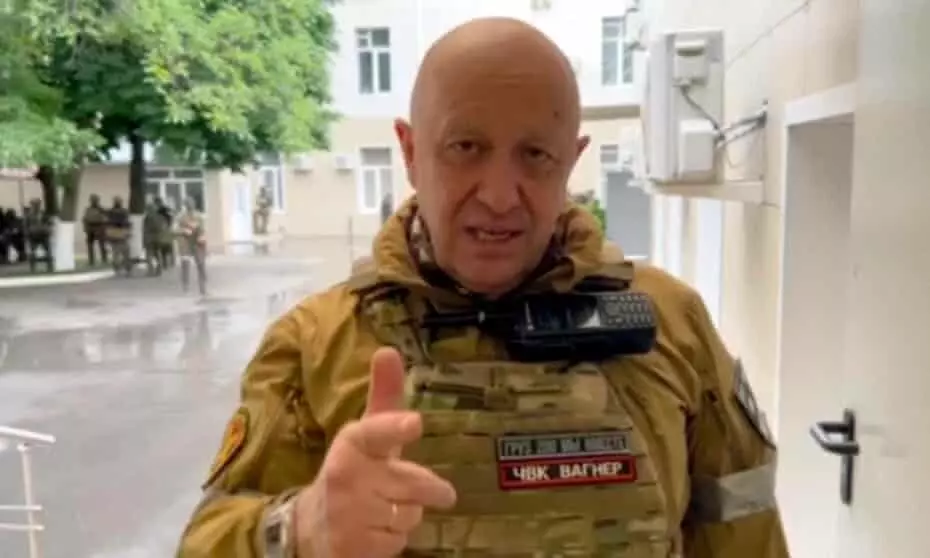
Putin claims he tried to oust Prigozhin after Wagner uprising but failed
text_fieldsVladimir Putin claims that after Yevgeny Prigozhin rejected his request to take over as the commander of Wagner's soldiers in Ukraine during a meeting at the Kremlin this month, he tried—but failed—to replace him.
In a startling revelation, Putin's version of events, which came in an interview with the Kommersant newspaper, revealed that the Russian leader was still negotiating a takeover of the Wagner mercenary group.
According to analysts, Putin's weakness and inability to control the tensions among the numerous power groups in his government were made evident by last month's brief Wagner rebellion, the Guardian reported.
Wagner instructors reportedly started to arrive in Belarus as part of an exile agreement negotiated with the Kremlin following an aborted mutiny, according to footage that Belarusian official television published on Friday.
After the mutiny, Putin, according to the journalist Andrei Kolesnikov, met with Prigozhin and 35 Wagner commanders at the Kremlin to discuss the mercenary group's continued involvement in Russia's war in Ukraine.
At the meeting, Putin said he gave Prigozhin the choice of allowing Wagner soldiers to serve in Ukraine under the command of Andrey Trochev, their battlefield commander.
“All of them could gather in one place and continue to serve,” Putin told Kolesnikov, who has covered the Kremlin leader for several decades. “And nothing would change for them. They would be led by the same person who had been their actual commander this entire time.”
The offer met with some support from the Wagner commanders, Putin said. “A lot of them nodded their heads when I said this. But Prigozhin, who was sitting in front of them and didn’t see [their reaction], said: ‘No, the guys won’t agree with that decision.’”
The interview seems to be a part of a larger Kremlin campaign to earn the Wagner rank and file's support, even as it tries to destroy Prigozhin by releasing sensitive and unflattering information regarding him.
In the same interview, Putin denied the existence of Wagner, citing a regulation in Russia that forbids private military firms and casts doubt on the company's future.
Dara Massicot, a senior policy analyst at the US think tank Rand who specialises in Russian military strategy, claimed that according to Putin's account of events, he was trying to put distance between Prigozhin and his fighters while also signalling his willingness to outlaw Wagner at any time.
“He is signalling: ‘I am going to separate Prigozhin from this tool, Wagner and the Wagner fighters, which I still need,” she said. “I still need that tool. I don’t need the man as much.”
But even as he attempted to reclaim his position as the "godfather" of numerous power interests in Russia, it was unexpected for Putin to make the unsuccessful negotiations with Prigozhin public.
“I don’t think this makes him look as strong as he thinks it does,” said Massicot, who described the supposed meeting as “theatre” after the failed rebellion. “This is messy.”
Abbas Gallyamov, a political consultant and a former speechwriter to Putin, said the fact the two met “showed that Putin was willing to normalise the relationship with Prigozhin”.
“Both sides still need each other,” Gallyamov said, but added that Putin’s remarks to Kommersant and the media campaign against Prigozhin suggested that the two sides “didn’t find common ground”.
News reports describing Prigozhin's business interests and assertions that he was ineffective and corrupt have continued to air on Kremlin-controlled media networks. Despite Prigozhin's claims that his fighters were routinely under-equipped, the Russian military asserted that it had recovered equipment, including some that it claimed was unused.
Following searches on his home and the offices of Wagner, embarrassing pictures of Prigozhin were also distributed to Telegram channels that supported the war. Some depictions of him in disguise— wearing artificial beards and hairpieces—led to ridicule of the mercenary leader.
On Friday, a picture that had been leaked showed Prigozhin lying on a bunk in a field tent with a Wagner emblem while still wearing only his underwear. It was not possible to establish the image's date right first, and it was unclear whether Prigozhin was in Belarus.
The first Wagner soldiers, according to a report on Belarusian state television that same day, had arrived at a military camp established in the Asipovichi village. In the first reported sighting of the Wagner soldiers in Belarus since the uprising, the mercenaries were seen instructing the local defence troops in weaponry and tactics. Wagner fighters are "serving as instructors in a number of military disciplines," according to the Belarusian defence ministry.
According to the US, Wagner has been mostly sidelined in Ukraine, a trend that started after the organisation declared its drawdown in May after crucial battles for the city of Bakhmut.
On Thursday, the Pentagon press secretary, Pat Ryder, said: “At this stage, we do not see Wagner forces participating in any significant capacity in support of combat operations in Ukraine.”
The majority of Wagner's fighters, Ryder said, had stayed in the Russian-occupied Ukraine where they had been stationed prior to the uprising.
His Concord Group's contracts to supply other Russian military outposts abroad, together with Prigozhin's profitable operations in Africa, could be a major prize for the Kremlin if they can be wrested from his control.
Galyamov said: “If Putin and Prigozhin put aside their emotions, rationally both players would prefer to make peace so that Russia could use the Wagner troops in Ukraine. Both sides need each other. For Putin, the higher goal is the war in Ukraine, while Prigozhin knows that without the president his position is very shaky.”






